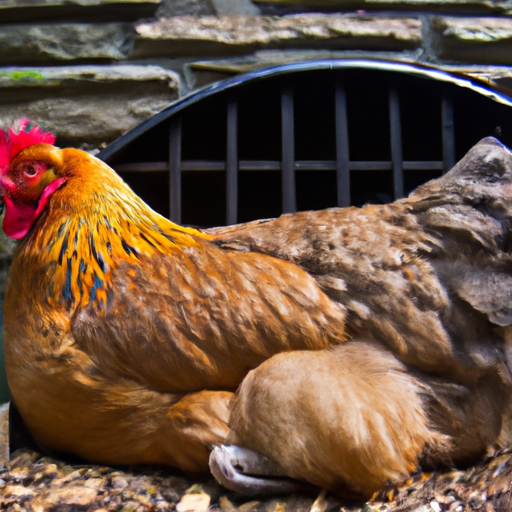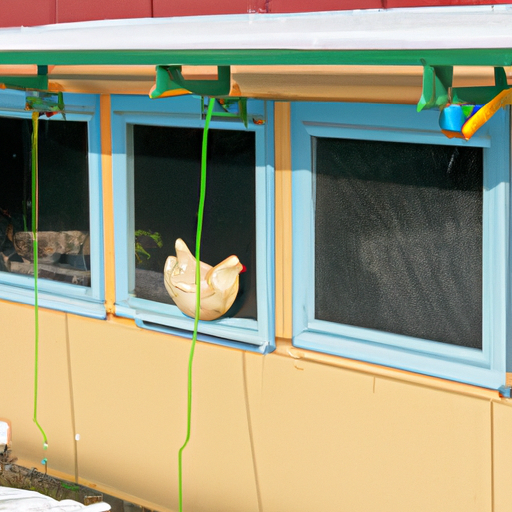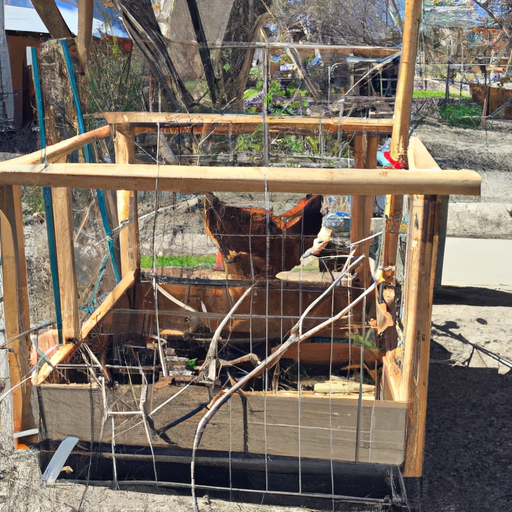Living in an urban area has its perks, but it also comes with challenges, especially when it comes to having a backyard chicken coop. While it’s great to have fresh eggs in the heart of the city, you may find yourself wondering how to minimize noise and prevent disturbances in your chicken coop. No worries, we’ve got you covered! In this article, we’ll explore some simple yet effective strategies that will help create a serene environment for both you and your feathery friends. From soundproofing measures to considering your neighbors, you’ll find all the tips you need to maintain harmony in your urban chicken coop.
Noise reduction strategies
Selecting the right chicken breed
When it comes to noise reduction in an urban chicken coop, selecting the right chicken breed can make a significant difference. Some breeds are naturally quieter than others, so it’s important to choose a breed that is known for being less vocal. Breeds like the Buff Orpington, Australorp, or Sussex tend to be calmer and quieter compared to breeds like Leghorns or Rhode Island Reds.
Using insulated coop materials
Insulating the coop with the right materials can help reduce noise transmission from inside the coop to the outside world. Consider using materials like foam insulation or sound-dampening panels to create a barrier that absorbs sound waves. Insulating the walls, roof, and floor of the coop can significantly reduce noise and prevent disturbances for both you and your neighbors.
Implementing soundproofing techniques
In addition to using insulated materials, there are other soundproofing techniques that can be employed to minimize noise from within the coop. One effective method is to line the interior walls of the coop with acoustic foam or soundproof curtains. These materials absorb sound waves and prevent them from bouncing off hard surfaces, thereby reducing noise levels. Additionally, installing soundproof windows and doors can further contribute to noise reduction.
Strategically placing the coop within the property
The placement of the chicken coop on your property can play a crucial role in noise reduction. Ideally, position the coop in an area that is furthest away from neighboring houses to minimize the impact of noise. If possible, consider locating the coop in an area surrounded by vegetation or other structures that can act as a natural sound buffer. By strategically placing the coop, you can help mitigate noise-related disturbances.
Managing coop activities
Establishing a strict routine
Establishing a strict routine for coop activities can help minimize noise and disruptions throughout the day. Keep a consistent schedule for feeding, cleaning, and any other necessary tasks to ensure a sense of calm and reduce unnecessary commotion. By having a predictable routine, the chickens will become accustomed to specific timings, which can help regulate their behavior and minimize noise.
Minimizing handling and movement during nighttime
Chickens are diurnal animals, meaning they are most active during the day and tend to rest at night. To prevent disturbances during nighttime, it’s important to minimize handling and movement around the coop during these hours. Avoid visiting the coop unnecessarily during the night and ensure that any necessary handling or feeding is done quietly and without causing unnecessary stress to the chickens.
Avoiding unnecessary disturbances near the coop
In addition to minimizing nighttime disturbances, it’s crucial to avoid unnecessary disturbances near the coop throughout the day. Loud noises, sudden movements, or excessive human activity around the coop can agitate the chickens and contribute to overall noise levels. By creating a peaceful environment around the coop, you can help minimize any potential disturbances and reduce noise.
Implementing quiet feeding and watering systems
The sound of chickens eating or drinking can sometimes be the source of noise in a coop. Implementing quiet feeding and watering systems can help reduce these noises significantly. Consider using automatic feeders and waterers that deliver food and water without causing loud clanging or banging sounds. By implementing these systems, you can ensure that the chickens have access to food and water while minimizing noise levels.
Controlling ambient noise
Using white noise machines or sound barriers
White noise machines or sound barriers can be effective tools in controlling ambient noise within and around the chicken coop. These devices emit a constant, low-level hum or white noise that can mask or minimize other sounds. Placing a white noise machine near the coop or installing sound barriers such as acoustic panels can help drown out external noise and create a more peaceful environment for both the chickens and surrounding neighbors.
Landscaping for noise absorption
Strategic landscaping around the coop can also contribute to noise reduction. Planting dense shrubs, bushes, or trees can act as a natural barrier, absorbing and deflecting sound waves. Choose plants with thick foliage that can create a physical barrier between the coop and neighboring properties. Not only will this help reduce noise, but it can also enhance the overall aesthetics of your coop area.
Creating a natural buffer zone around the coop
Creating a buffer zone around the coop is another effective way to control ambient noise. By separating the coop from neighboring properties with the help of fences or hedges, you can minimize the direct transmission of noise. Additionally, strategically positioning other structures or features, such as sheds or walls, between the coop and nearby residences can further enhance noise reduction efforts.
Addressing specific noise sources
Reducing vocalizations
Chickens are known for their vocalizations, especially when laying eggs or expressing distress. While it may not be possible to completely eliminate these noises, there are steps you can take to reduce them. Providing a comfortable and stress-free environment for your chickens through proper coop design, adequate space, and appropriate nesting boxes can help minimize excessive vocalizations. Additionally, selecting quieter chicken breeds, as mentioned earlier, can also help reduce overall noise levels.
Minimizing flapping noise
Another common source of noise in a chicken coop is the sound of flapping wings. To minimize this noise, ensure that the coop is spacious enough to allow unrestricted wing movement. Providing adequate perches and roosts of appropriate dimensions can also help reduce flapping noise by giving chickens a place to comfortably rest without feeling cramped. Regularly inspect the coop for any sharp edges or objects that could potentially cause injury to the chickens and lead to excessive flapping.
Muffling egg-laying sounds
The sound of hens laying eggs can be disruptive and loud, especially in confined spaces. To help muffle these sounds, consider providing nesting boxes that are lined with soft materials like straw or wood shavings. The use of nesting box curtains can also help dampen the noise. As with vocalizations, creating a stress-free environment through proper coop design and the selection of suitable chicken breeds can contribute to quieter egg-laying experiences.
Noise-proofing the coop structure
Sealing gaps and cracks
Inspect the coop for any gaps or cracks that might be letting sound escape. By sealing these openings, you can prevent noise from filtering out and disturbing the surroundings. Use weather-resistant sealant or caulk to seal small gaps around windows, doors, and other openings. For larger gaps, consider using foam insulation or other appropriate materials to create a tight seal.
Adding weatherstripping to doors and windows
Doors and windows are common areas where sound can escape from the coop. Adding weatherstripping to these openings can effectively reduce noise transmission. Apply self-adhesive weatherstripping around the edges of doors and windows to create a tight seal when closed. This will help block out external noise and keep the coop quieter.
Upgrading ventilation systems with noise-reducing features
Ventilation is essential for maintaining a healthy coop environment, but it can contribute to noise if not appropriately designed or maintained. Consider upgrading your ventilation system to include noise-reducing features. Look for fans or air circulation systems specifically designed to minimize noise. Regularly clean and maintain any existing ventilation systems to ensure they are functioning optimally without creating unnecessary noise.
Proper coop maintenance
Regular cleaning to prevent ammonia buildup
Routine cleaning is essential not only for the health and well-being of the chickens but also for noise reduction. Ammonia buildup in the coop can contribute to increased vocalizations and unpleasant odors. Regularly clean the coop, removing waste and maintaining cleanliness to prevent ammonia buildup. Use appropriate disinfectants that are safe for chickens to ensure a hygienic environment.
Checking and repairing any loose or squeaky parts
Loose or squeaky parts in the coop can create noise when chickens move or interact with them. Regularly check for any loose hinges, latches, or other components that may need tightening or repairing. Lubricate hinges and other moving parts to prevent squeaking sounds. By addressing these small maintenance tasks promptly, you can help keep the coop quiet and functioning smoothly.
Replacing worn-out insulation materials
Over time, insulation materials in the coop may degrade or become less effective. Inspect the insulation regularly and replace any worn-out or damaged materials. Upgrading to high-quality insulation materials can help improve noise reduction capabilities. Fresh insulation will not only contribute to a quieter environment but also ensure that the coop maintains a comfortable temperature year-round.
Inspecting and maintaining equipment for noise reduction
If you have implemented any noise-reducing equipment or systems in the coop, such as sound barriers or white noise machines, regularly inspect and maintain them. Ensure that they are functioning properly and replace any worn-out parts or components. By keeping your noise reduction equipment in good working order, you can continue to enjoy a quieter coop environment.
Educating neighbors
Sharing information about chicken behavior and noise patterns
One of the best ways to address concerns about noise from your urban chicken coop is to educate your neighbors about chicken behavior and noise patterns. Explain that chickens are naturally vocal animals and that their vocalizations are a normal part of their behavior. Help your neighbors understand that you are taking steps to minimize noise and create a peaceful environment for both the chickens and the neighborhood.
Discussing coop maintenance efforts
Engage in open conversations with your neighbors about the efforts you are making to maintain a quiet coop. Share details about the noise reduction strategies you have implemented and explain how these measures are designed to minimize disturbances. By keeping your neighbors informed, they will have a better understanding of your commitment to noise reduction and may be more understanding and supportive.
Offering fresh eggs as a gesture of goodwill
As a gesture of goodwill and appreciation, consider offering your neighbors fresh eggs from your urban chicken coop. This thoughtful gesture can help build positive relationships and show your neighbors that you value their understanding and support. Sharing the rewards of keeping chickens can create a sense of community and promote better understanding of the benefits of urban chicken coops.
Legal considerations and permits
Researching local regulations on chicken coops
Before establishing an urban chicken coop, it is crucial to research and understand the local regulations and ordinances regarding chicken keeping. Different areas have specific rules regarding coop size, distance from neighboring properties, and noise restrictions. Ensure that you comply with all relevant regulations to avoid any legal issues and maintain good relations with your neighbors.
Obtaining required permits
In addition to understanding the regulations, determine if any permits are required for keeping a chicken coop in your area. Contact your local municipality or zoning department to inquire about the necessary permits. Applying for and obtaining the required permits will help ensure that your coop is compliant with the local regulations and prevent any potential issues in the future.
Understanding noise ordinances and restrictions
Familiarize yourself with local noise ordinances and restrictions that may apply to your urban chicken coop. Each area may have specific guidelines regarding noise limits and quiet hours. By understanding and adhering to these regulations, you can avoid potential conflicts with neighbors or noise-related legal issues.
Creating a sound barrier
Building a solid fence around the coop
Constructing a solid fence around the perimeter of your chicken coop can serve as a physical barrier to reduce noise transmission. A solid fence made of materials like wood or vinyl can help contain the noise within the coop and prevent it from reaching neighboring properties. Ensure that the fence is tall enough to prevent chickens from flying over and that any gaps between panels are sealed properly.
Utilizing thick vegetation as a noise buffer
In addition to a solid fence, utilizing thick vegetation can provide an additional layer of sound absorption. Plant tall shrubs, bushes, or trees around the coop to act as a natural noise buffer. The dense foliage will help block and absorb sound waves, minimizing noise levels both within the coop and in surrounding areas.
Installing sound-absorbing panels on nearby structures
If there are existing structures near your chicken coop, such as sheds, garages, or walls, consider installing sound-absorbing panels on these surfaces. These panels are designed to absorb sound waves, redirecting or reducing noise levels. By installing sound-absorbing panels on nearby structures, you can help minimize noise transmission and create a more peaceful environment for everyone.
Seeking professional advice
Consulting with acoustic experts
If you are facing significant noise-related challenges in your urban chicken coop, it may be beneficial to consult with acoustic experts. These professionals specialize in noise reduction and can provide tailored solutions to address your specific situation. They can assess the noise sources, evaluate the coop design, and suggest noise reduction techniques that can effectively mitigate noise levels.
Hiring a professional contractor for noise reduction solutions
For more extensive noise reduction solutions, such as installing acoustic insulation or implementing complex soundproofing techniques, consider hiring a professional contractor. These experts have the knowledge and experience to recommend and implement specialized noise reduction solutions that are most suitable for your coop. By working with a professional, you can ensure that noise reduction efforts are maximized and effectively implemented.
Joining online forums or local community groups for guidance
If you’re looking for advice and guidance from fellow chicken owners, consider joining online forums or local community groups dedicated to urban chicken keeping. These platforms provide opportunities to connect with experienced individuals who can share their own noise reduction strategies and provide valuable insights. Engaging with these communities can offer support, encouragement, and new ideas to help you find effective solutions for noise reduction in your urban chicken coop.
In conclusion, reducing noise and preventing disturbances in an urban chicken coop requires a combination of thoughtful strategies and proactive measures. By selecting the right chicken breed, implementing soundproofing techniques, managing coop activities, controlling ambient noise, addressing specific noise sources, noise-proofing the coop structure, properly maintaining the coop, and educating neighbors, you can create a quieter and more harmonious environment for both your chickens and the surrounding community. Additionally, ensuring compliance with local regulations, creating a sound barrier, and seeking professional advice when needed will contribute to a successful noise reduction journey. With careful planning and a commitment to noise reduction, an urban chicken coop can be a peaceful and enjoyable addition to any neighborhood.




